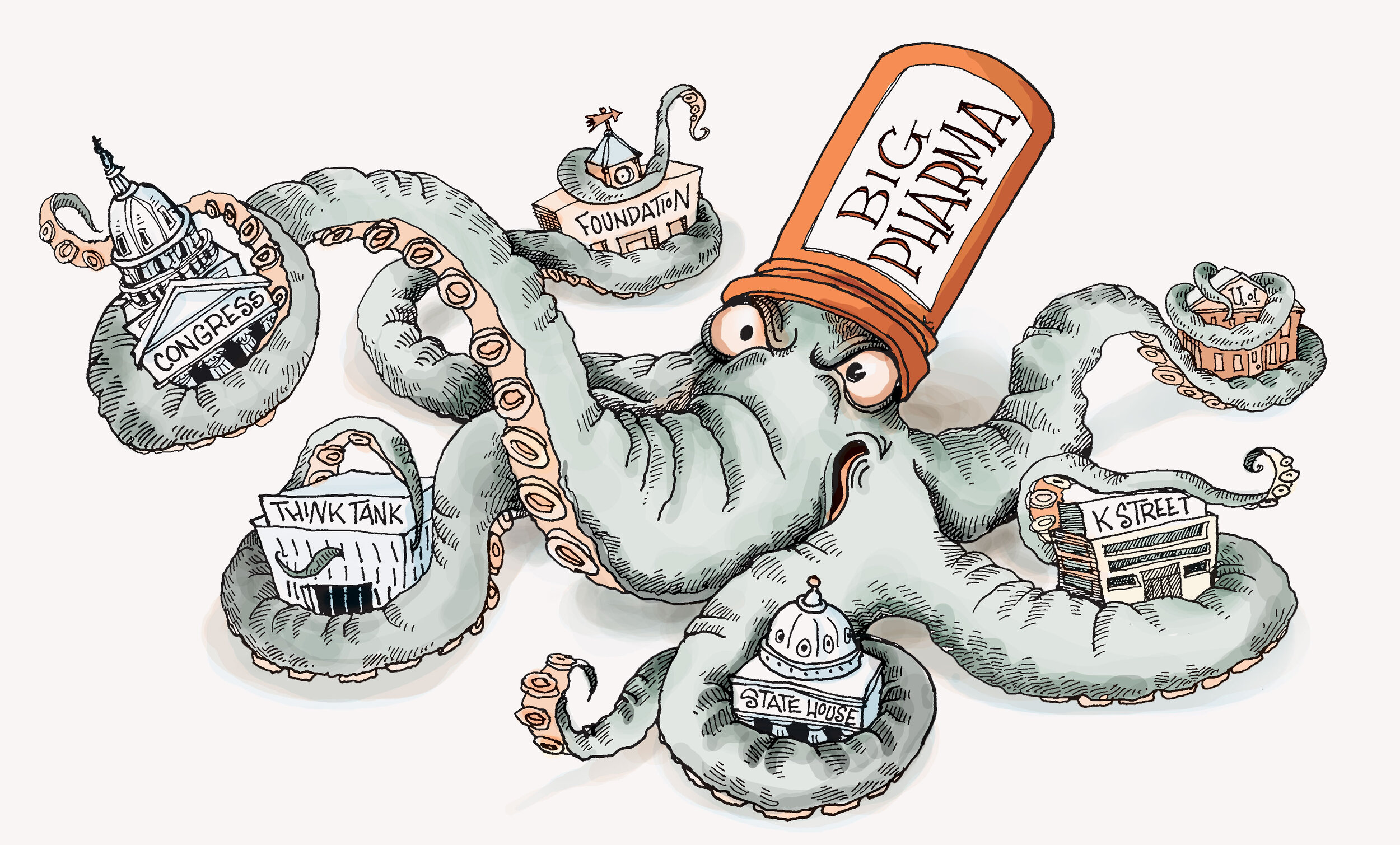
Congress Itself Is A Corporation's Best Investment
At this point in American society, it’s no secret that “Big Money Interests” are exerting historic influence on public policy and lawmaking – just about every citizen from every shade of the political spectrum would agree with that statement.
But what does this actually look like? Is it really as simple as “powerful company gives money to politician and politician does what they say?” Surely it can’t be that simple, right? Well, in a two-party system in which the number-one objective for elected officials is to make sure they get re-elected – or to have lucrative employment opportunities after leaving public office – money doesn’t just talk, it shouts. Re-election campaigns cost money, and who has more money than special interest groups? There’s a reason that Congresspeople and Senators literally spend over half of their time in office making fundraising calls.
While it might not quite be that simple, when we unpack the mechanics and the economics of lobbying, and how powerful it can be in shaping the destiny of public legislation, it’s hard to avoid this conclusion: spending money on Congress – lining the pockets of officials from both political parties – and the people we vote to represent us, is one of the best investments a corporation can possibly make.
Prepare to feel gross.
How To Get Massive Returns On Your Investment Through Lobbying
Let’s say you’re a major corporation working in a sector that the United States government deems absolutely necessary, like healthcare, insurance, or defense contracting. These are highly scrutinized industries that are no stronger to provoking public ire, so you’re worried about your ability to keep generating record-breaking profits.
If you’re a defense contractor like Northrop Gunman or Lockheed Martin, it’s in your best financial interest to make sure the United States stays engaged in military actions around the world, despite the fact that a majority of U.S. citizens want to reduce military spending.
If you’re a major private healthcare provider or drug manufacturer, it’s in your best financial interest to make sure any bills that could lead to lower prescription drug prices never become law, despite the fact that an overwhelming majority of Americans support letting the government negotiate drug prices.
In a democracy that purports to be of the people, by the people, and for the people, how on earth will you be able to enact such a deeply unpopular agenda?
The answer can be found in one dreaded word: lobbying.
That’s right, lobbying. The act of putting enormous sums of money into highly organized and effective groups that essentially “persuade” elected officials to do their bidding. Lobbying, in conjunction with unaccountable dark money campaign donations, are the two most powerful tools at a company’s disposal for when they need to make sure legislation that would otherwise be historically popular never sees the light of day.
Let’s go back to our defense contractor example. According to the Center for Media and Democracy, since 2002 (aka the eve of the Iraq War) just 5 individual defense companies have spent about $1.2 billion lobbying and donating to both the Democratic and Republican parties – or about $240 million per company over the last 20 years.
That sounds like a huge amount of money, right? Holy crap, a billion dollars!
Then consider that over the same time period, those same 5 companies have reaped $2.3 TRILLION just in Pentagon contracts alone.
You read that right. Trillion. With a T.
Let’s do some simple math here. 5 companies spend $1.2 billion to lobby the federal government – against the wishes of the majority of voters – and in return, they receive $2.3 trillion not just in profits, but in direct contracts from the federal government itself. That means over the past 20 years, for every $1 companies like Lockheed Martin spend on campaign contributions and lobbying groups, they are directly earning $1,916(!) from the federal government – aka YOUR TAX DOLLARS.
That's an increase of 191,500%.
Any financial investor would tell you that doubling your money means you made a good investment - you earned 100% of your money back. Earning a 10x return in your investment means you made an exceptionally good investment - you earned back 900% of your initial investment. Earning 191,500% of your investment is off-the-charts profitable, a number so incomprehensibly large that the human brain can hardly wrap its mind around it.
And then you learn that defense contractors aren’t even the industry that lobbies the government the most. That award goes to the pharmaceutical industry.

Pharmaceutical companies collectively spent over $360 million in 2021 alone in order to lobby public officials to supporting their interests – in specific, they targeted H.R. 3, the Elijah Cummings Lower Drug Prices Now Act, which would let the federal government negotiation much lower Medicare drug prices (a policy supported by 83% of Americans, by the way).
What did they get for their $360 million investment? The bill has died in the Senate every year it’s been up for a vote – with decisive votes halting its progress coming from both Senate Republicans and Senate Democrats. Powerful politicians from both sides of the aisle have their campaigns funded in no small part due to massive pharmaceutical donations. And in that same time frame – one year – the top 10 highest-earning pharmaceutical companies alone took home about $145 billion in profit.
$360 million on lobbying. $145 billion in profit. We’ll let you do the math on that one.
It’s Not Just Lobbying - Campaign Contributions Go A Long Way Too
Oh, you thought that lobbying was the extent to which corporations profit off of getting public officials to ignore public opinion? Well, we’ve got some bad news for you: special interests also directly contribute to the campaign funding for specific politicians they believe can advance their financial interests.
What a joy.
Let’s take Pete Buttigieg for example. Before he ran for president in 2020, Pete was publicly pro-Medicare For All and supposed universal single-payer healthcare. During the course of the primary election, as his campaign gained steam, Pete began attracting big donations from the pharmaceutical industry and for-profit healthcare sector – so much money, in fact, that he was second only to then-President Trump in attracting big healthcare industry donations – to the tune of over $1 million in a single quarter.
Then, on a dime, Pete’s campaign started backtracking on Medicare For All, instead promoting a compromised “Medicare For All Who Want It” system as he began to attack candidates like Elizabeth Warren and Bernie Sanders who supported universal healthcare in full.
The lesson here is one of prescience: powerful, monied interests don’t only spend money to influence politicians in office, but they’re proactive about influencing those who might win office in the future, effectively capturing their loyalty in advance, on the chance that they do win office. And in a two-party primary system in which whoever raises the most money generally goes on to victory, it becomes too seductive for candidates to turn down major donations. Pete’s past policy positions vanished in the face of fundraising dollars, and he’s just but one example.
That’s the power of campaign contributions, an arguably even more direct form of financial leverage that huge industries puppet over office holders and those running. And not only is this completely legal, it’s commonplace. This is just one example, of one politician, on one issue. Extrapolate this principle to D.C. at large – and all the different massive industries at large – and you’ll begin to get a slightly fuller picture of how bad this problem can get.
All of this is to underscore how important it is that Americans start to elect politicians that are not beholden to special interest lobbying and big money campaign contributions. The more representation our political system gets from candidates that reject big money influence, the better chance we have at passing laws and policies that actually line up with the priorities of the American people – not the priorities of wealthy investors at major corporations.
